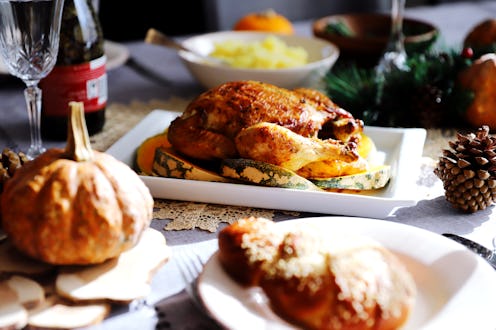
Thanksgiving is an opportunity to spend time with the people you love, but the seemingly relaxing holiday can be stressful if your family members have problematic viewpoints. Last year, some millennials avoided going home for Thanksgiving altogether to avoid arguing with family members about President Donald Trump. Things haven't gotten much better since then —there are a wealth of controversial things that may come up when talking to family members, like immigration policy and NFL national anthem protests. When it comes to tense dinner conversations, you might be tempted to avoid conflict, but one organization is encouraging white people to have those uncomfortable talks at Thanksgiving dinner. Showing Up For Racial Justice (SURJ) created a mobile hotline that helps you figure out what to say to racist relatives at Thanksgiving.
SURJ co-director Heather Cronk tells Bustle the organization created the hotline last year in the aftermath of Trump's election win. She said the tool is designed to "help folks push through those conversations."
"White supremacy isn't new, but it's been emboldened by the fact that there are white supremacists sitting in the White House right now — and the responsibility for that rests with white people," she says. "Even if you didn't vote for Trump yourself, people around you did — so it's vital that white folks break the white silence that has allowed white supremacy to fester and grow, even if that means making yourself (or your family) uncomfortable."
The hotline is super easy to navigate. You text 'SOS' (or a turkey emoji) to 82623 and are provided with a list of topics. Within seconds, you receive a response with talking points.
You'll first be offered talking points about immigration, national anthem protests, Thanksgiving's origins, and Trump and racism, but there are even more options. The hotline also offers things to say about sexual assault, Trump and the economy, nuclear war, and the U.S. government's response to Puerto Rico after Hurricane Maria.
Cronk says the hotline was created with white people in mind. SURJ's website says the tool is to "help support white folks in having tough conversations with other white folks."
"SURJ's mission is to undermine white support for white supremacy. While the organization isn't a 'white only' space, many of the folks who organize with SURJ are white — and all of us are focused specifically on moving white people away from white supremacy and toward racial justice and collective liberation. That means that white people need to take responsibility for talking with other white people — and that includes our families, but also includes co-workers, neighbors, friends, church members, and others who are in our social networks."
It can be easy to avoid conflict for the sake of keeping the peace, especially during family time, but it's important for white allies to stand up when they notice injustice. When people of color are asked to educate white people, it creates an unfair expectation of emotional labor for people of color to perform. Cronk says she hopes the hotline provides support "to folks who are nervous about having these conversations."
SURJ also offers a discussion guide focused on indigenous issues. Thanksgiving has pretty troubling origins, and your relatives may not be aware of how Thanksgiving actually originated. If you choose to call out your relatives, you may feel disappointed if no one changes their viewpoint. But your words still have an impact.
"While you may not be able to convince your racist uncle that white supremacy is real, you can bet that your cousin is listening to the conversation and soaking everything in. So while it might be more comfortable to pull someone aside for a 1:1 conversation, we hope this tool — as well as the discussion guides and "placemat" graphics available on our website — helps empower folks to have these conversations out in the open with confidence."
Thanks to these resources from SURJ, there's no reason to avoid educating your loved ones this holiday. It may feel uncomfortable, but starting a conversation by challenging problematic viewpoints could actually make a difference.